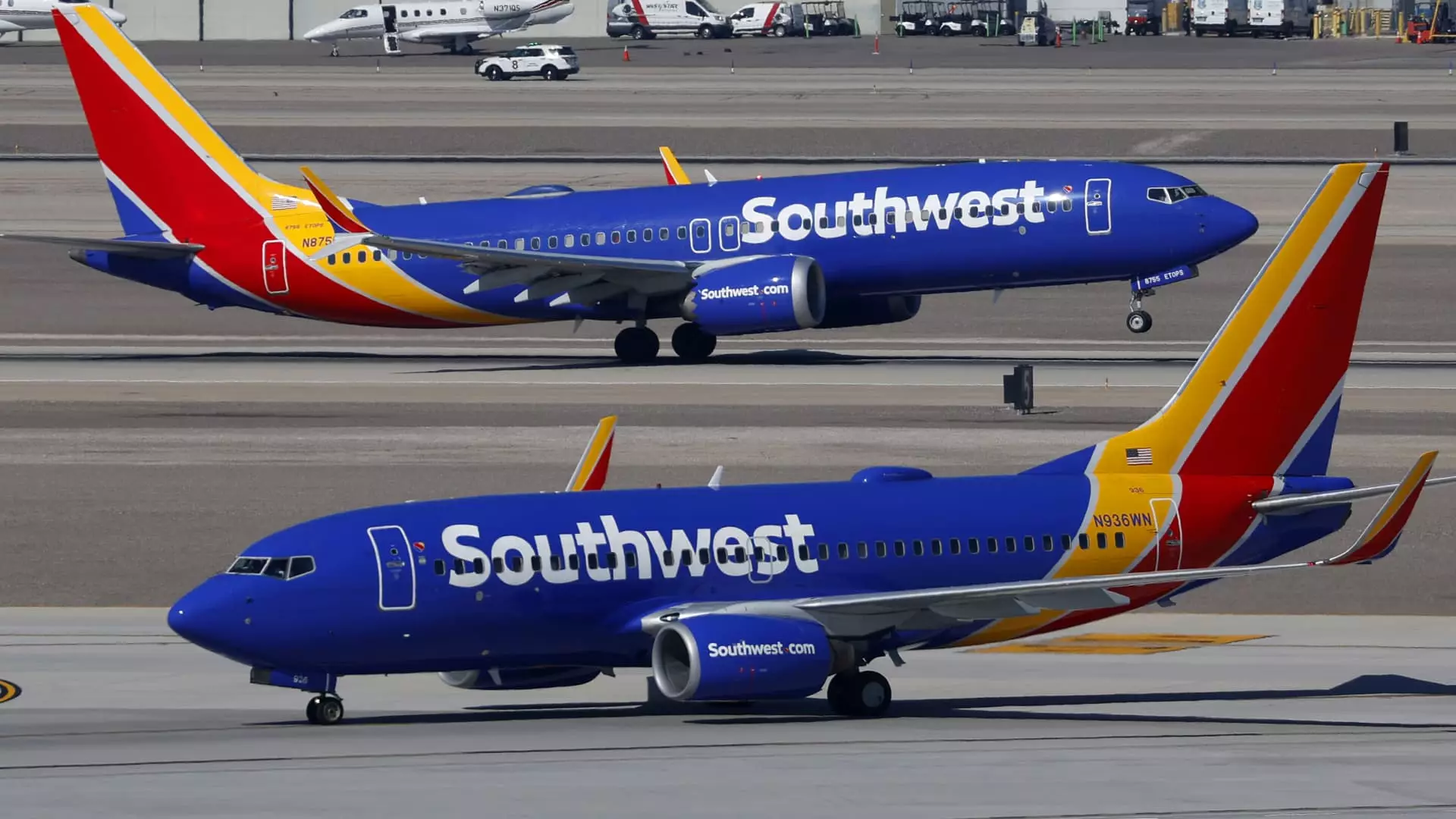For over 50 years, Southwest Airlines distinguished itself from competitors by upholding a unique open seating policy—one that fostered a sense of spontaneity and fairness, at least in theory. Passengers would arrive early, stake out their spots, and board as part of a lively, albeit unpredictable, process. Now, this cherished tradition is set to vanish on January 27, marking an undeniable shift toward a more corporate, revenue-driven model. Despite its reputation for affordability and customer-friendly policies like free checked bags, Southwest evidently recognizes that cutting-edge profit margins now demand the erosion of these once-pivotal customer experiences.
This change signifies a calculated gamble by Southwest’s leadership—an acknowledgment that the airline must adapt to an increasingly competitive landscape. Airlines like Delta and American have long employed assigned seating and ancillary fees to boost revenue, and Southwest’s decision to follow suit signals a shift in the industry’s ethos. From July 29 onward, tickets will be available with pre-selected seats, flipping the script on loyalty and spontaneity to prioritize efficiency and profitability. Displacing the unpredictability of open seating isn’t just about modernization; it reflects an unsettling obsession with profit maximization, even at the expense of passenger experience.
Profitability Over Customer Loyalty: The Erosion of Southwest’s Unique Identity
Southwest’s open seating policy was a cornerstone of its brand—emblematic of an egalitarian, customer-focused approach that fostered loyalty through simplicity and transparency. Its elimination indicates a profound reorientation toward revenue strategies that favor high-margin options and personalized services. The airline’s move to charge for preferred seats, extra legroom, and prioritized boarding aligns with a broader industry trend, but for Southwest, it feels like a capitulation to corporate greed.
This shift raises fundamental questions about the airline’s core values. Will passengers accept the loss of spontaneity just to enjoy marginally better seats? Or will this change alienate its most loyal customers, who valued affordability and egalitarian boarding? The allocation of boarding groups based on tier status and seat selection privileges the wealthier and more frequent travelers—those willing to pay extra—yet complicates and perhaps democratizes the boarding process. This creates a tiered experience that challenges Southwest’s historically inclusive approach.
Moreover, by introducing assigned seats, the airline is essentially gambling with its reputation. Loyalty was once fostered through the communal chaos of open boarding, a phenomenon that created shared experiences and a sense of fairness in its randomness. Transitioning to a highly structured, tiered boarding process risks fragmenting this community even further, possibly turning passengers into passive consumers rather than participants in a shared journey.
The Cost of Modernization: Balancing Efficiency with Passenger Satisfaction
Southwest’s venture into assigned seating is partly motivated by operational efficiency. The airline claims to have used extensive testing to ensure this change won’t slow down boarding and turnaround times—an essential factor in airline profitability. Yet, this technical justification overlooks a broader picture: the human element of flying. While boarding quickly and maximizing plane utilization are tempting metrics for executives, what about the intangible value of passenger loyalty rooted in familiarity and fairness?
This shift signifies a clear prioritization of revenue streams over the emotional, social aspects of flying that Southwest once championed. First-class upgrades, priority boarding, and seat selection used to be enjoyed by a select few; now, these privileges are becoming the norm for paying customers. While this might tentatively increase short-term revenue, it risks devaluing the brand’s reputation for simplicity and kindness, eventually driving away customers who trusted Southwest as a friendly, egalitarian alternative.
Furthermore, the move suggests a broader industry trend—airlines are increasingly viewing flying as an experience to monetize rather than an affordable necessity. Tolling fees for checked bags, assigned seating, and early boarding are commodifying what was once considered basic service. For Southwest, this could be a strategic necessity, but it also marks a clear departure from the core value proposition that made it stand out.
Implications for the Future: A Business Model in Flux
Southwest’s bold transformation highlights a pivotal inflection point: a traditional brand reshaping itself amid rising competition and shrinking margins. The airline’s promise to generate an estimated $800 million in extra earnings this year, and a projected $1.7 billion by 2026, underscores the financial imperative driving these changes. It’s a calculated move to stay relevant, agile, and profitable in an environment increasingly dominated by more profitable competitors.
Yet, this also invites skepticism. Will passengers accept a less egalitarian, more transactional experience? Will the allure of free checked bags and open seating survive the shift toward a pay-to-choose model? The reality is that Southwest risks sacrificing its distinctive identity in pursuit of short-term gains, possibly undermining customer loyalty in the longer term.
As the airline industry continues to evolve, Southwest’s foray into assigned seating and ancillary fees—though economically justified—serves as a stark reminder of how quickly brands can pivot from shared community to commercial enterprise. The real question remains whether this strategy will bolster profits without irreparably damaging the airline’s reputation as a customer-centric company or if it will accelerate a decline into a less personal, more commodified travel experience.

